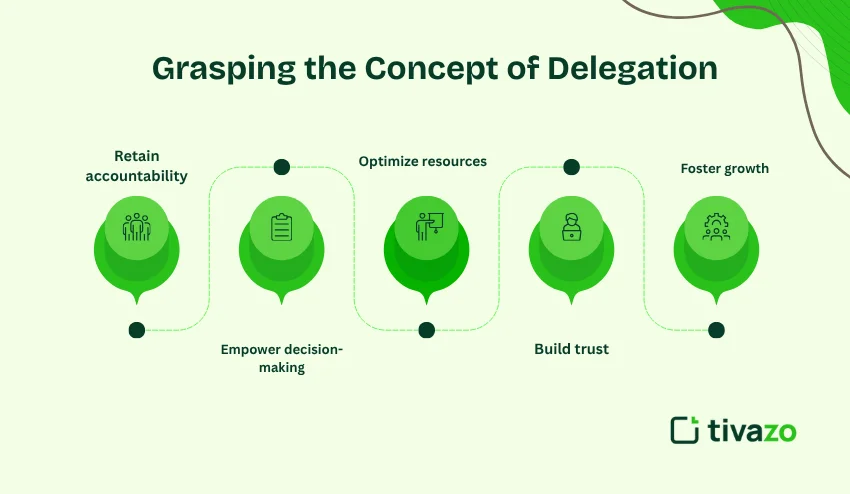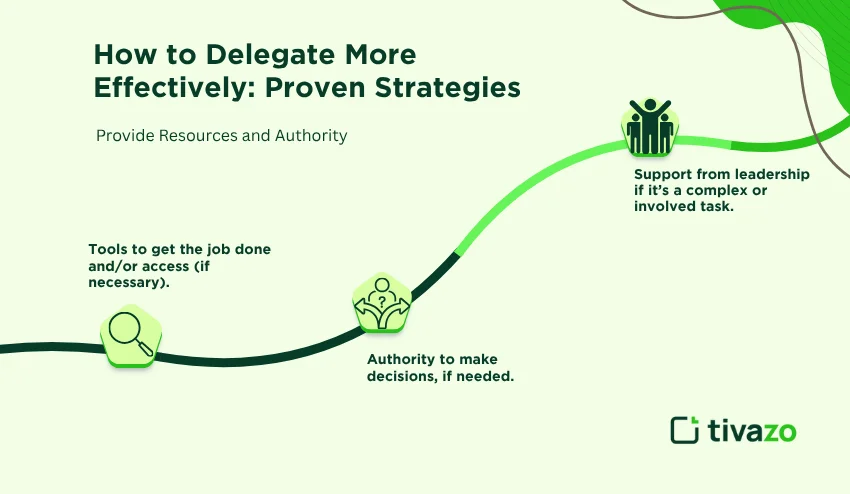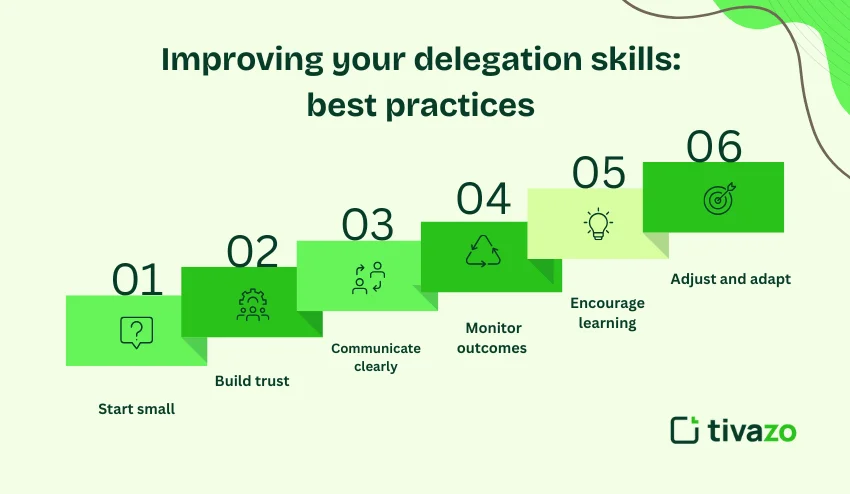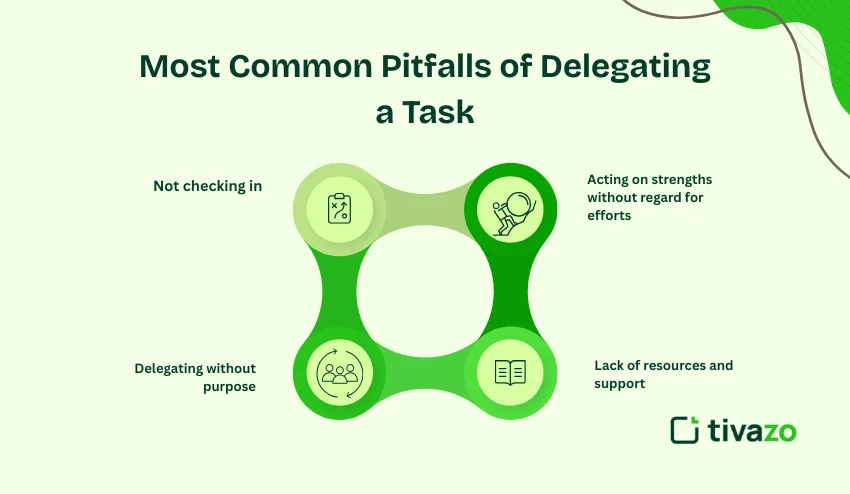Delegation is an essential skill for individuals who lead, manage, or are part of a team that seeks to accomplish even more while minimizing their stress levels. Learning to delegate more effectively not only increases productivity but can also engage your team members and strengthen your leadership. The ability to delegate helps leaders focus on important tasks, minimizes their chance of burnout, and ensures projects are completed on time and within budget. Effective delegation also helps team members take responsibility for and ultimately take pride in their work by developing skills and confidence.
In this resource, we address critical questions related to delegation, identify common barriers and delegation mistakes individuals experience, and provide concrete action plans to help individuals delegate more effectively and consistently everywhere they work. Managing a small team or leading a large organization without learning to delegate is not sustainable for personal or team success, nor is it sustainable in work life.
Grasping the Concept of Delegation: What It Truly Entails
Delegation is more, much more than passing off work to others. The essence of delegation is about:
- Transferring the responsibility of work while remaining accountable: You are ultimately accountable for the final result, even when someone else is doing the actual work for you.
- Enabling others to make decisions and perform the work independently: Enabling the team(s) you belong to gives them authority to act, promotes confidence, encourages creativity, instills independence, and promotes ownership.
- Managing resources to focus on the most pressing work: Delegation allows leaders to spend their time focusing on strategic decisions and high-level critical work.
- Developing trust and maximizing teamwork: If done appropriately, delegation breeds trust and open lines of communication and respect among the team.
- Fostering professional development: Delegating meaningful work allows a team member to begin designing new skills and position them for further accountability in the future.
When you are capable of delegate more effectively, you are getting work done efficiently, while simultaneously building an engaged, capable, and motivated workforce.

Why Delegation Matters in Leadership and Management
Leaders who do not delegate will find it challenging to scale their impact. Effective delegation is important because it:
- Releases leaders to focus on strategic objectives
- Enables tasks to be completed by the right team members
- Promotes stewardship and accountability
- Stimulates growth and motivation for the team
Understanding how to delegate more effectively is a key element of successful leadership.
Common Issues with Delegation
Delegating work is not so simple. When leaders delegate, they commonly make a few mistakes:
- Micromanaging what someone does may be better than trusting them to perform the tasks themselves in some cases; however, it saps your abs your team generally will disengage and slow productivity.
- Delegating without clear instructions is ambiguous and can lead to mistakes, deadlines not being met, and others missing, also wasting your time to provide feedback and clarity.
- Overloading one team member with work and the others not so much or none at all is bad for their morale and does not help the overall team productivity.
- Not following up or giving feedback to other team members; if no feedback is given, push is heard, they might feel devalued and find it harder to align back with the original request.
Additionally, some common challenges and issues are fear of losing control, not knowing what your team members are capable of, and not wanting to delegate the task because the leader feels they will do better. Understanding these delegation issues will help you learn to delegate more effectively, to build stronger and more capable teams, while getting work done effectively and efficiently. Timely delegation inspires trust in your team, holds your team accountable, and builds each other’s skills and professional development.
How to Delegate More Effectively: Proven Strategies
Here are 7 actionable strategies to improve your delegation skills:
1. Identify Tasks that Can Be Delegated
Consider :
- Routine or repetitive tasks.
- Tasks outside of your core capabilities.
- Tasks that will help your team members grow.
This will allow for effective delegation, while keeping you focused on strategic priorities.
2. Delegate Based on Skill Sets
Match tasks with a team member’s skill set:
- Assess experience and capabilities.
- Prioritize a task that meets a person’s career development goal.
- Be mindful of their workload.
Matching skill sets with tasks will allow you to delegate more effectively and build confidence in your team.
3. Establish Clear Goals and Expectations
Clarity is crucial:
- Write out the desired outcome.
- Establish a deadline and prioritize the task.
- Let the individual know how and when you expect to see the results.
Providing clarity helps everyone to understand what success looks like and helps you delegate more effectively.
4. Provide Resources and Authority
Empower someone by providing Resourceful support:
- Tools to get the job done and/or access (if necessary).
- Authority to make decisions, if needed.
- Support from leadership if it’s a complex or involved task.
Resources and authority can help you delegate more effectively while reducing bottlenecks.

5. Go for the Outcomes, Not the Process
Share the ownership:
- Set goals and key results
- Don’t micromanage everyone step along the way.
- You can do periodic check-ins without standing over someone every moment.
Letting someone own the process will help you delegate more effectively while trusting your team to be innovative, focused, and gain ownership over their work.
6. Feedback and Recognition
It is crucial to facilitate two-way communication:
- Constructively assess results.
- Give recognition for effort and accomplishment.
- Engage in reflection on lessons learned to improve future work.
- Feedback builds trust and allows you to delegate more effectively with this confidence.
7. Technology to Support Delegation
Technology can make it easier to supervise task completion, improve team outcomes, and simplify your task management:
| Tool | Examples | Benefits |
| Task Management | Asana, Trello | Keep track of progress versus timelines |
| Communication | Slack, Trello | Keeping the team aligned on response times |
| Automation | Hubstaff, Monday.com | Reduce the work that is duplicated |
Not all tasks require in-house delegation; some administrative work can be more efficiently managed through external support. Professional virtual assistants are trained to handle routine tasks such as scheduling, data entry, and email management with minimal supervision. By delegating administrative responsibilities to dedicated support staff, leaders can create more bandwidth for strategic planning and team development.
Having technology will allow leaders to delegate more effectively on tasks, oversee the work, and give feedback much more easily. When tools are in place, you can create an efficient structure for delegating more effectively on the tasks without trying to manage and monitor ad hoc. Technology creates an infrastructure to streamline the work through digital tracking and automation, which reduces errors, saves time, and ensures accountability for all team members.
Technology also allows for remote work, so managers don’t lose team unity, productivity, and outcomes when members are working dispersed. When you appropriately use technology to delegate more effectively, you will have team buy-in, outcomes, and engagement.
Improving your delegation skills: best practices
To continuously improve your delegation skills, you may want to consider the following best practices:
1. Start small
When beginning the delegation process, start by giving team members small tasks to gain a level of comfort and ownership before scaling their level of responsibility. This will allow both you and the team to ease into delegation and prepare for more responsibility as they become comfortable with the delegation process.
2. Build trust
Allow team members the responsibility to make their own choices for how they will complete work. You must build trust in others to help you learn how and/or when to delegate more effectively.
3. Communicate clearly
Provide team members with definitive instructions, an end goal, and timelines. When you communicate effectively, there are fewer errors, miscommunications, and frustrations, which allows you to delegate jobs more easily and quickly.
4. Monitor outcomes
Check to see how things are going, provide positive and constructive feedback, and celebrate when a member achieves success. Monitoring allows you to practice the art of delegation and to ensure some degree of responsibility while providing clear accountability.
5. Encourage learning
Allow team members to test their ideas, make mistakes, and learn from them. Encouraging a team member to learn from a mistake not only builds a skill but can also increase confidence and independence to further their learning.
6. Adjust and adapt
Flexible assessments of workloads, skills, and task complexity are necessary for increased efficiency. Adaptability and flexibility can enhance delegation in any situation.
With these best practices in mind, you have the potential to create a productive, self-motivated, and skilled workforce while maximizing your results to delegate more effectively.

Most Common Pitfalls of Delegating a Task
Delegation is not easy, and avoiding common pitfalls is critical for success.
- Not checking in: Delegation does not stop when the task is assigned to someone sure to check in regularly to ensure everyone is on the same page, and more importantly, to be available for needed guidance. Ongoing check-ins create accountability and will support more successful delegation.
- Delegating without purpose: When a team does not know the ‘why’ behind a task, they won’t go the extra mile (and will be less likely to hit the intended result of the project). Delegation that focuses on articulating the objectives, due dates, and desired outcomes will be more effective.
- Acting on strengths without regard for efforts: Simply performing the bulk of tasks for someone who has demonstrated a skill can lead to productivity switching to burnout and resentment. Change up the task regularly to manage workloads and seek to develop the skills of others in the team. Delegating tasks based on an individual’s strengths while also exploring growth opportunities will help to not only delegate more effectively, but also create a more tenured and capable team.
- Lack of resources and support: Including the necessary tools, information, and authority to complete the task. While competent on their own, even the best team members can be held back by the lack of adequate support to assist them.

By recognizing and avoiding these pitfalls, leaders can create a more productive, motivated, and empowered team while developing and enhancing their capacity for consistent, resilient delegation.
Conclusion
Learning to delegate more effectively is important for any leaders, managers, or team members who want to accomplish more with less stress. Effective delegation increases output and also engages your team members, which builds trust and develops skills. By understanding delegation, avoiding common mistakes, using technology, and implementing best practices, you will have a team that performs better and is more engaged and capable of delegate more effectively over the long term. Just remember, delegation is not simply handing off a task to someone else.
It is about the process of sharing work for more successful outcomes that develops leadership and encourages team collaboration and development. Start applying these pieces today, and you will see your team thrive.




